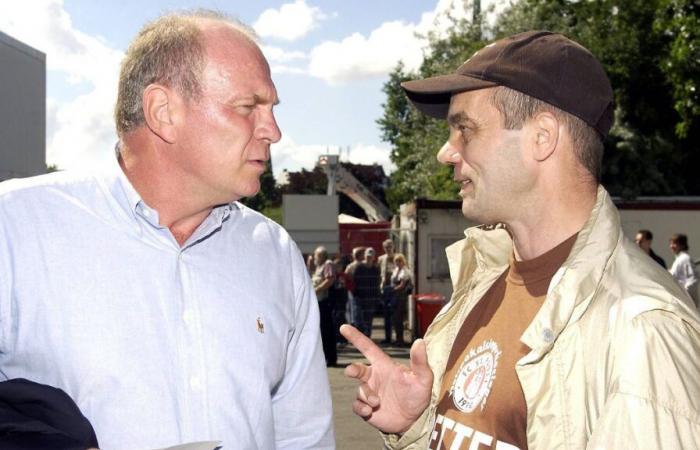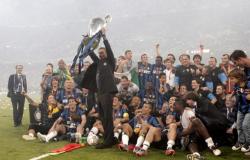This Saturday, FC Bayern plays FC St. Pauli in Hamburg. A duel with a very special history. Even before the “World Cup winner” was born in the 2000s and Bayern supported the Kiezkicker in solidarity, there were games with a lot of emotions – and personal attacks!
“Overall, better than the hotheads wanted to admit,” wrote the “Kicker” on Monday after FC St. Pauli’s memorable duel at home against FC Bayern Munich 35 years ago about the performance of referee Klaus Broska from Gelsenkirchen. The good man had previously played a special kind of “emotionally charged game” confidently over long stretches – even though the game had already caused a lot of headlines and excitement in advance.
Just a year earlier, another referee, Hellmut Krug, had already come close to calling off the game between the two extremely different clubs (“Two Worlds: Poor versus Rich”). After a tomato hit Olaf Thon and a beer bottle was thrown at Ludwig “Wiggerl” Kögl, Bayern threatened to leave the pitch. In the end it was only with great difficulty that the encounter was able to last. But emotions continued to run high between the two teams for a longer period of time.
“Only compete in protest!”
Now FC St. Pauli and FC Bayern Munich met again almost exactly a year later on a Friday evening at the end of October 1989. But the mood was not only heated because of last year’s impulsive meeting between the two teams, but above all because of something else. The club’s “MillernTor Magazine” for the game against FC Bayern had the headline “The Class Struggle” on the cover. In the magazine itself, the official stadium newspaper, which was supposed to have a circulation of 10,000 copies, discussed the “strictly capitalist-oriented glamor world of FC Bayern”. Manager Uli Hoeneß sensed a “smear campaign” and announced with a red face: “We are only competing in protest. This is sedition!”
Hoeneß saw the magazine for the first time on NDR television the evening before the game and immediately said angrily: “That’s a mess! I defend myself with the greatest vehemence against the portrayal that everything is being shoved up the Bayern players’ backsides.” only the St. Pauli players have to work for it.” This was preceded by a flippant remark from coach Helmut Schulte, who said in the magazine: “It’s clear that work is fighting against capital on the field.” It was also Schulte who coined the title of the offensive stadium newspaper with a statement: “Anyone who signs with Pauli knows that they are up to the class struggle.”
“Attack on freedom of the press”
But Hoeneß was not only offended by the coach’s words, but also by a passage on page 4 of the magazine that read: “In an interview, the sausage manufacturer Hoeneß (‘Nürnberger Bratwürstl’) gave a guest appearance as a social ethicist: ‘If I When I hear about the unemployed, I have to laugh my ass off. I’m convinced that half of them have no interest in working.” After Uli’s protests Hoeneß and FC Bayern, FC St. Pauli finally decided to withhold the magazine. It was argued that “sanctions would have to be feared” in the event of riots. However, the magazine’s editor in charge, Werner Langmaack, didn’t like the sales stop at all: “This is an attack on press freedom!”
- Ben Redelings is a best-selling author and comedian from the Ruhr area.
-
His current work is “The New Book of Football Sayings” with well over 10,000 sayings from the colorful world of football.
-
He travels all over Germany with his football programs. Information & dates on www.scudetto.de.
And of course the district association from Hamburg didn’t let the matter rest so easily. The politician and vice-president of FC St. Pauli, Hans Apel, said smugly: “Before 1918, there was an lese majeste paragraph in German criminal law. Apparently the Bayern board believes that this paragraph still exists. End of announcement!”
And the makers of the magazine also reacted in their own way to the Bayern manager’s protest in a press release and wrote with a twinkle in their eye: “1. Hoeneß doesn’t seem like a loan shark, but like a Samaritan and fighter of poverty and hunger in the third world World. 2. He has no bitter facial features, but a fresh, open and sympathetic face, his glasses are not monkeyy, but rather stylish, his skin color is not cheesy, but rosy, especially when he comes out of the mask before television appearances 3. Hoeneß did not miss the decisive penalty at the 1976 European Championship, but converted it elegantly and unsustainably.”
“Uli, Uli”
After the game, which Bayern won 2-0, the Munich team’s emotions had not yet boiled down, as was the reaction of Jupp Heynckes (“Rübenacker with a hostile mood”) and Ludwig Kögl (“You could have fed yourself on that for 14 days” , about the objects that were thrown onto the Millerntor lawn again this time) about the game. But then there was peace between the two clubs for many years. Until Bayern’s fatal embarrassment in the league’s “house of joy” in 2002. But this defeat of the record champions changed a lot in the internal relationship between the two clubs.
Just a year later, Bayern played a charity game for FC St. Pauli in Hamburg at the old Millerntor Stadium. That day, over 20,000 spectators celebrated Uli Hoeneß, who did a lap of the stadium alongside the beaming President Corny Littmann in the brown “World Cup Winner-Besieger-Savior” shirt, with loud shouts of “Uli, Uli”.
Of course, the Bayern manager really liked that – and remembering the old days, he said: “The atmosphere here used to be exactly the opposite. It’s nice that people can still be grateful. We wanted this game to get the people involved to the heart, and we hit the jackpot with this football festival.” And that was the end of the “class struggle” chapter between the two very different clubs.






